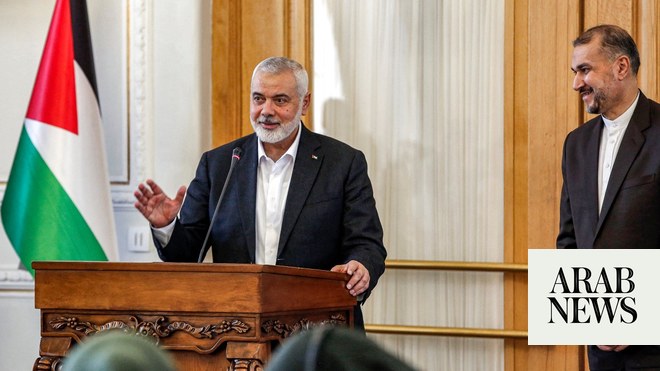DUBAI: The assassination of Hamas leader Ismail Haniyeh in the early hours of Wednesday morning in Iran has drawn regional and global reactions, sparking fears of wider escalation in a region rocked by Israel's war on Gaza and a worsening conflict in Lebanon.
Hamas said Haniyeh was killed in an Israeli strike in Iran, where he was attending the inauguration of the country's new president.
Iran's powerful military Revolutionary Guards confirmed Haniyeh's death and said in a statement that “Iran and the resistance front will respond to this crime,” using a term Tehran uses to refer to allied militant groups from the Middle East.
There was no immediate comment from Israel on the strike.
Iran's Supreme Leader Ayatollah Ali Khamenei vowed revenge on Israel for the killing of Hamas's political chief, saying Israel had “prepared a severe punishment for itself”.
“We consider his revenge our duty,” in a statement on its official website, saying Haniyeh was “a dear guest in our home.” Iran also declared three days of mourning after the killing of the Hamas chief.
Senior Hamas official Sami Abu Zuhri told Reuters: “This assassination by the Israeli occupation of brother Haniyeh is a serious escalation that seeks to violate the will of Hamas.”
He said Hamas would continue on the path it was following, adding: “We are confident of victory.”
Palestinian President Mahmoud Abbas condemned Haniyeh's killing, and Palestinian factions in the occupied West Bank called for a general strike and mass demonstrations.
Russia on Wednesday denounced Haniyeh's killing as an “unacceptable political assassination”.
“It is a completely unacceptable political assassination, and this will lead to a further escalation of tensions,” Russian Deputy Foreign Minister Mikhail Bogdanov told state news agency RIA Novosti.
Konstantin Kosachev, deputy chairman of the Federation Council in Russia's upper house, said he expected “a sudden escalation of mutual hatred in the Middle East”.
“The most difficult period of confrontations begins in the region,” he wrote on Telegram.
Upon Haniyeh's death, China's Foreign Ministry said China opposes and condemns the act of “assassination”.
Turkish President Recep Tayyip Erdogan condemned the “treacherous assassination” in Tehran of his close ally and “brother” Haniyeh.
“May God have mercy on my brother Ismail Haniyeh, martyred after this heinous attack,” Erdogan wrote on social media platform X, denouncing “Zionist barbarity.”
“This shameful act aims to sabotage the Palestinian cause, the glorious resistance in Gaza and the just struggle of our Palestinian brothers and to intimidate the Palestinians,” Erdogan added.
Qatar strongly condemned Haniyeh's assassination as a heinous crime, “a dangerous escalation and a flagrant violation of international and humanitarian law”.
Qatar's Ministry of Foreign Affairs stressed in a statement that “the reckless killing and targeting of civilians will plunge the region into chaos and undermine the chances of peace.”
Yemen's Iran-backed Houthi militant group called Haniyah's killing a “heinous terrorist crime.”
“Al visa is a heinous terrorist crime and a flagrant violation of laws and ideal values,” Mohammed Ali Al-Houthi, a member of the Houthis' politburo, posted on X.
Egypt said the Israeli escalation indicated a lack of political will on Israel's part for de-escalation after Haniyeh's killing.
A statement from the Egyptian Foreign Ministry said this escalation, along with no progress in Gaza ceasefire talks, complicates the situation.
Yemeni rebels have been launching drones and missiles at ships in the Red Sea since November, saying they are acting in solidarity with Palestinians during the war in Gaza.
Lebanon's armed group Hezbollah expressed its condolences on Wednesday but did not specifically blame Israel. Haniyah's killing was said to make Iran-aligned groups such as Hezbollah and Hamas more determined to confront Israel.
There was no immediate reaction from the White House to Haniyeh's killing.
Asked by reporters in Manila about the Tehran strike, US Defense Secretary Lloyd Austin said he had “no further information to provide”. But he expressed hope for a diplomatic solution on the border between Israel and Lebanon.
